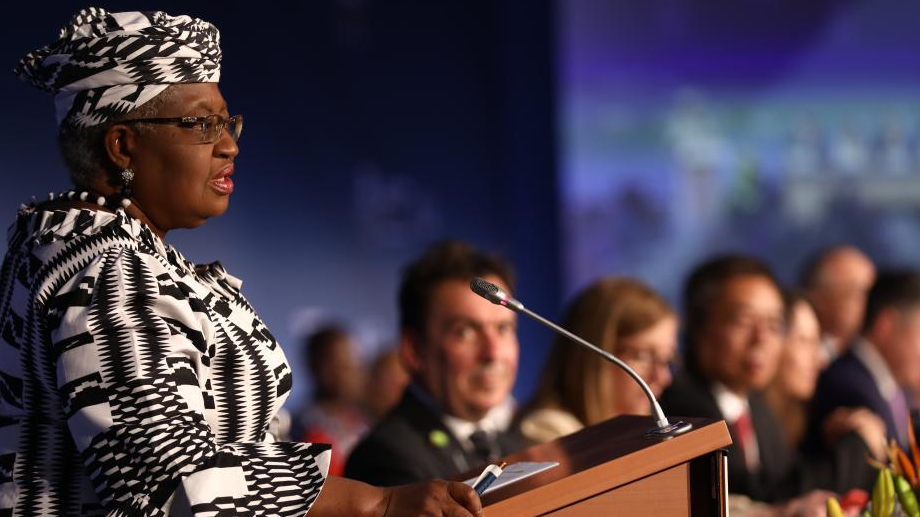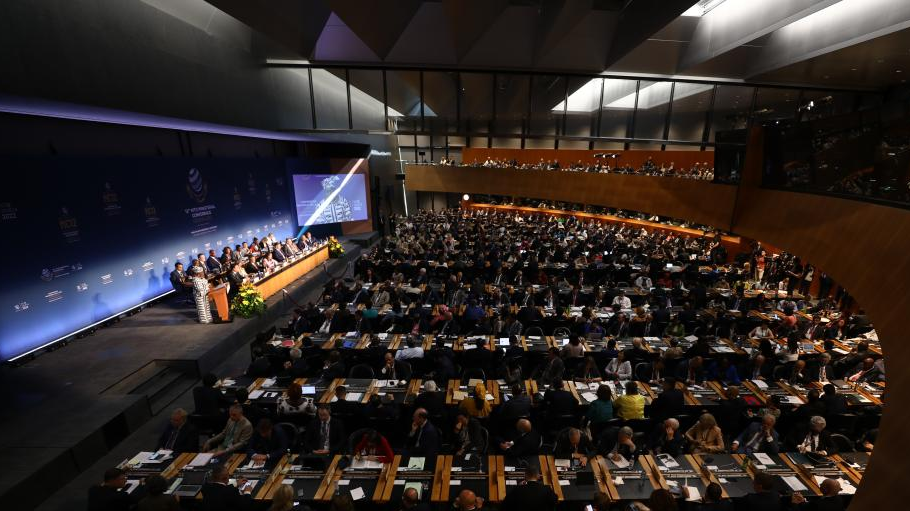
Director-General of the World Trade Organization (WTO) Ngozi Okonjo-Iweala (Front) addresses the opening ceremony of the WTO's 12th Ministerial Conference in Geneva, Switzerland, on June 12, 2022. /Xinhua
Director-General of the World Trade Organization (WTO) Ngozi Okonjo-Iweala (Front) addresses the opening ceremony of the WTO's 12th Ministerial Conference in Geneva, Switzerland, on June 12, 2022. /Xinhua
Editor's note: Kong Qingjiang is Dean of the School of International Law at China University of Political Science and Law. The article reflects the author's opinions and not necessarily the views of CGTN.
The trade community around the world is hailing the unexpected success of the 12th Ministerial Conference (MC12) of the World Trade Organization. After being postponed several times due to the COVID-19 pandemic, MC12 had found itself caught between a rock and a hard place: one the one hand, the world's trading body, which has been in an ailing state for ages, needs a spur with concrete results; on the other hand, the internal conflicts within the multilateral trade organization do not leave too much hope to the trading community and pragmatic negotiators.
After all, with the fallout of the Doha Round the WTO has been unable to set up rules for freer trade for nearly 13 years. Even worse, the dispute settlement mechanism, which was designed to be the pillar of the multilateral trading system, was paralyzed with the demise of its Appellate Body. Moreover, the WTO stood aside, finding itself unable to do anything when an unprecedented trade war broke out between the United States and China, the two largest trading nations within the trading body.
As a matter of fact, certain WTO members have attempted to retrench the rules in the WTO so as to address the issues that are believed to be brought forth by so-called "state-capitalism." Amid the disruption of the world's supply chains by the COVID-19 pandemic and the conflict between Russia and Ukraine, as well as the food crisis that is looming large, the world has become more divided. While some trading nations are genuinely pushing for new rules to make the WTO more relevant, other countries seemed to be determined to pursue a rule-based, yet ideology-guided multilateral trading system even at the expense of a split and marginalized WTO. Against this backdrop, the expectation of MC12 became even more modest when it convened in Geneva, Switzerland on June 12.

Director-General of the World Trade Organization (WTO) Ngozi Okonjo-Iweala (at the podium) addresses the opening ceremony of the WTO's 12th Ministerial Conference in Geneva, Switzerland, on June 12, 2022. /Xinhua
Director-General of the World Trade Organization (WTO) Ngozi Okonjo-Iweala (at the podium) addresses the opening ceremony of the WTO's 12th Ministerial Conference in Geneva, Switzerland, on June 12, 2022. /Xinhua
As the negotiations around COVID-19 patent licensing, fishery subsidies, etc. unfolded round the clock, even the prospect of achieving a moderate goal became gloomy. When the scheduled days of MC12 were about to run out, it was almost certain that the trade ministers would have to go home with empty hands. Therefore, the external observers were calmed to learn that WTO Director General Ngozi Okonjo-Iweala on June 16 asked the trade ministers and representatives to stay on for one more day before they were to conclude MC12.
It really turned out to be a shocking moment when the news resonated in Geneva that MC12 was securing multilaterally negotiated outcomes on a series of key trade initiatives. The dramatic change was in part due to the handsome coordination of the DG, and attributable at large to the resilience of the multilateral trading system.
The success of MC12 confirms the historical importance of the multilateral trading system and underscores the important role of the WTO in addressing the world's most pressing issues. The WTO members at the last moment decided to cooperate rather than continue to align themselves with an ideological line. It is a victory because of the human reason: coexistence and co-development outweigh conflicts and struggles.
Of course, it is premature to say at this joyful moment that the achievements of MC12 will lead to the renaissance of the WTO. The resumption of the Appellate Body would be a test for the true resilience of the multilateralism the world needs, especially at a time when global solutions are critical.
(If you want to contribute and have specific expertise, please contact us at opinions@cgtn.com. Follow @thouse_opinions on Twitter to discover the latest commentaries on CGTN Opinion Section.)

